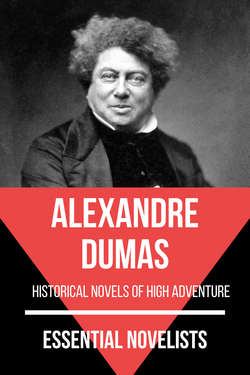Читать книгу Essential Novelists - Alexandre Dumas - Alexandre Dumas, Alexandre Dumas, The griffin classics - Страница 3
На сайте Литреса книга снята с продажи.
ОглавлениеAuthor
ALEXANDRE DUMAS WAS born Dumas Davy de la Pailleterie on July 24, 1802, in Villers-Cotterêts, France, to Marie Louise Labouret and General Thomas-Alexandre Davy de la Pailleterie. The Dumas family name was adopted from Alexandre's grandmother, an enslaved Haitian woman named Marie-Césette Dumas. After her husband's death, Marie Louise Labouret worked hard to provide an education for her son. Dumas attended Abbé Grégoire's school before dropping out to take a job assisting a local notary.
In 1822, Dumas moved to Paris and immersed himself in literature. He worked as a scribe for the duc d'Orléans (later named King Louis Philippe) during the 1830 revolution. He began writing plays, both comedies and dramas. Dumas's Romantic style—often compared to that of his contemporary and rival, Victor Hugo—proved to be exceptionally popular.
Dumas was a prolific writer of essays, short stories and novels, as well as plays and travelogues. His interests also encompassed crime and scandals and wrote eight volumes of essays on infamous cases in history such as that of Lucrezia Borgia and Cesare Borgia, and names more contemporary to his time, like Karl Ludwig Sand. But he achieved widespread success with his novels The Count of Monte Cristo and The Three Musketeers, initially published as serials.
With the money he earned from publishing his novels, Dumas purchased land and built the Château de Monte Cristo in Port Marly, Yvelines, France. This home (which is now a museum) was intended to be a sanctuary for the author, and he spent much of his time writing and entertaining there before debt overtook him, forcing him to sell the property. He fled to Belgium in 1851, and later to Russia, to evade creditors. Dumas continued to publish books, including travel books on Russia, during his period of exile.
Dumas had a son, also named Alexandre, with Marie Laure Catherine Labay. His son followed in his literary footsteps. In 1840, Dumas married actress Ida Ferrier, but continued his affairs with other women. He had at least one daughter, Marie Alexandrine, out of wedlock, and dated much younger women in his old age.
Dumas died on December 5, 1870, at his son's home in Puys, France. He was buried in the cemetery of Villers-Cotterêts. In 2002, his body was moved to the Panthéon in Paris, where Dumas rests among such other French literary greats like his rival Victor Hugo, Émile Zola and Jean-Jacques Rousseau.
